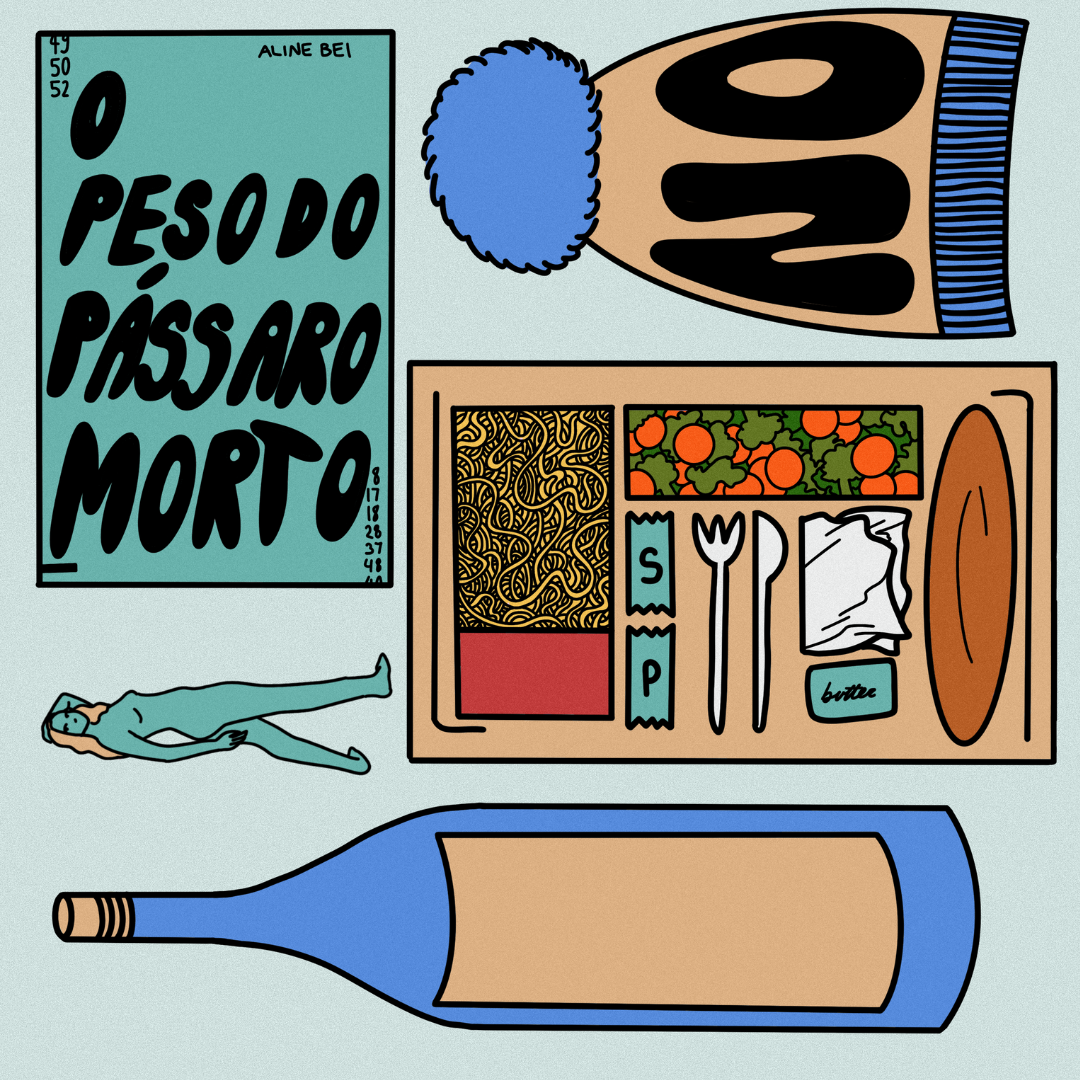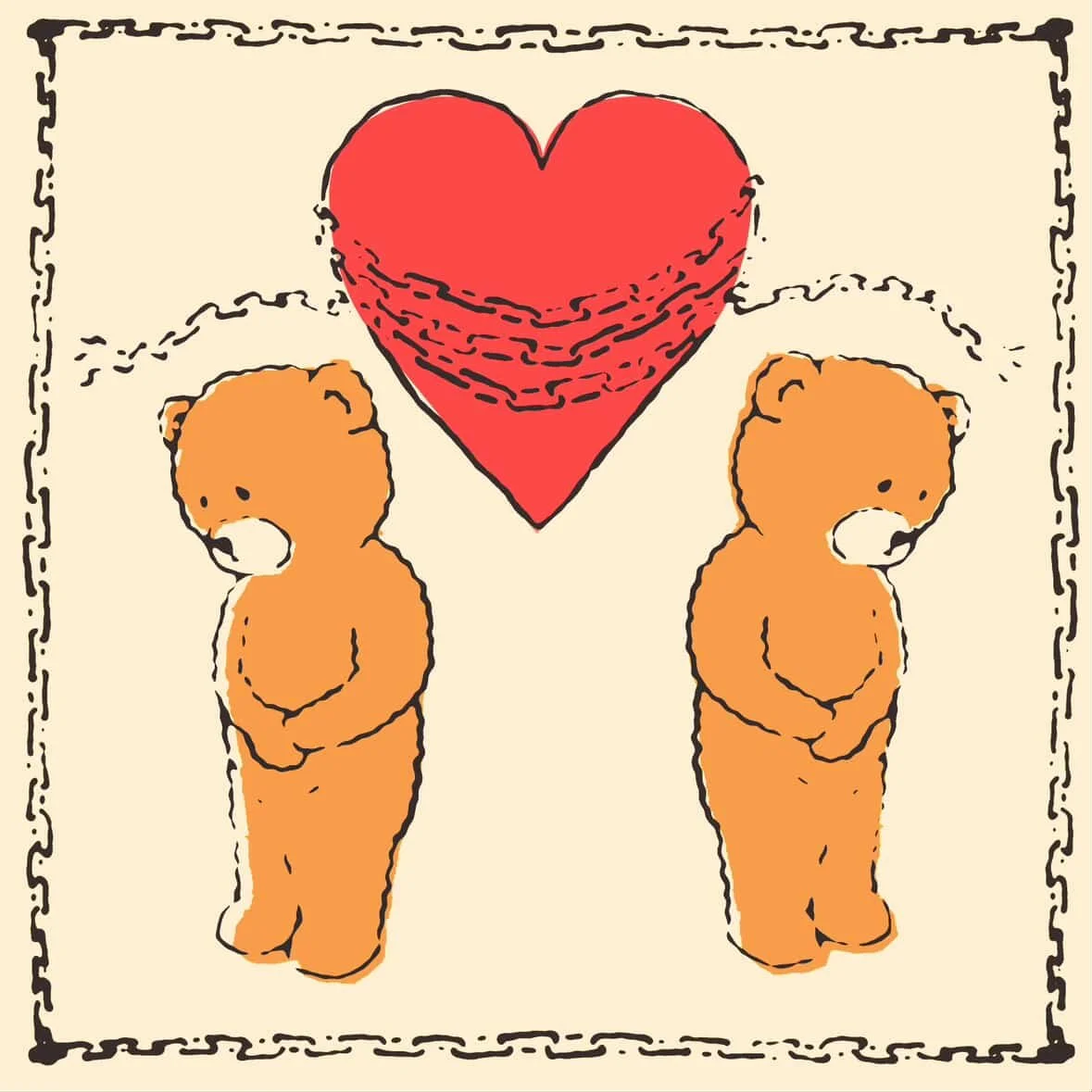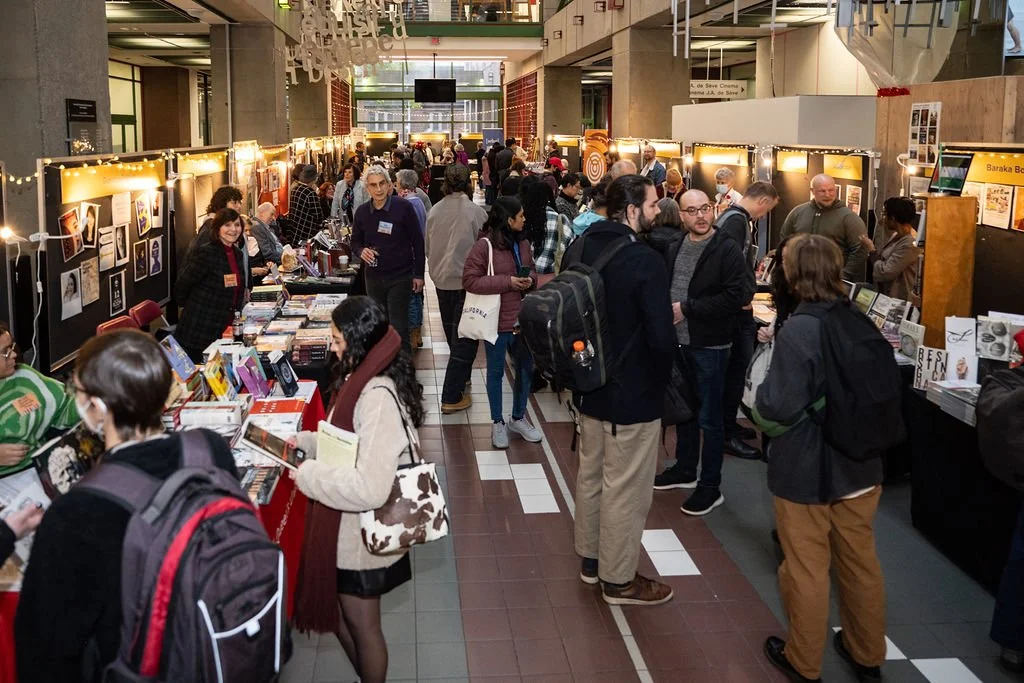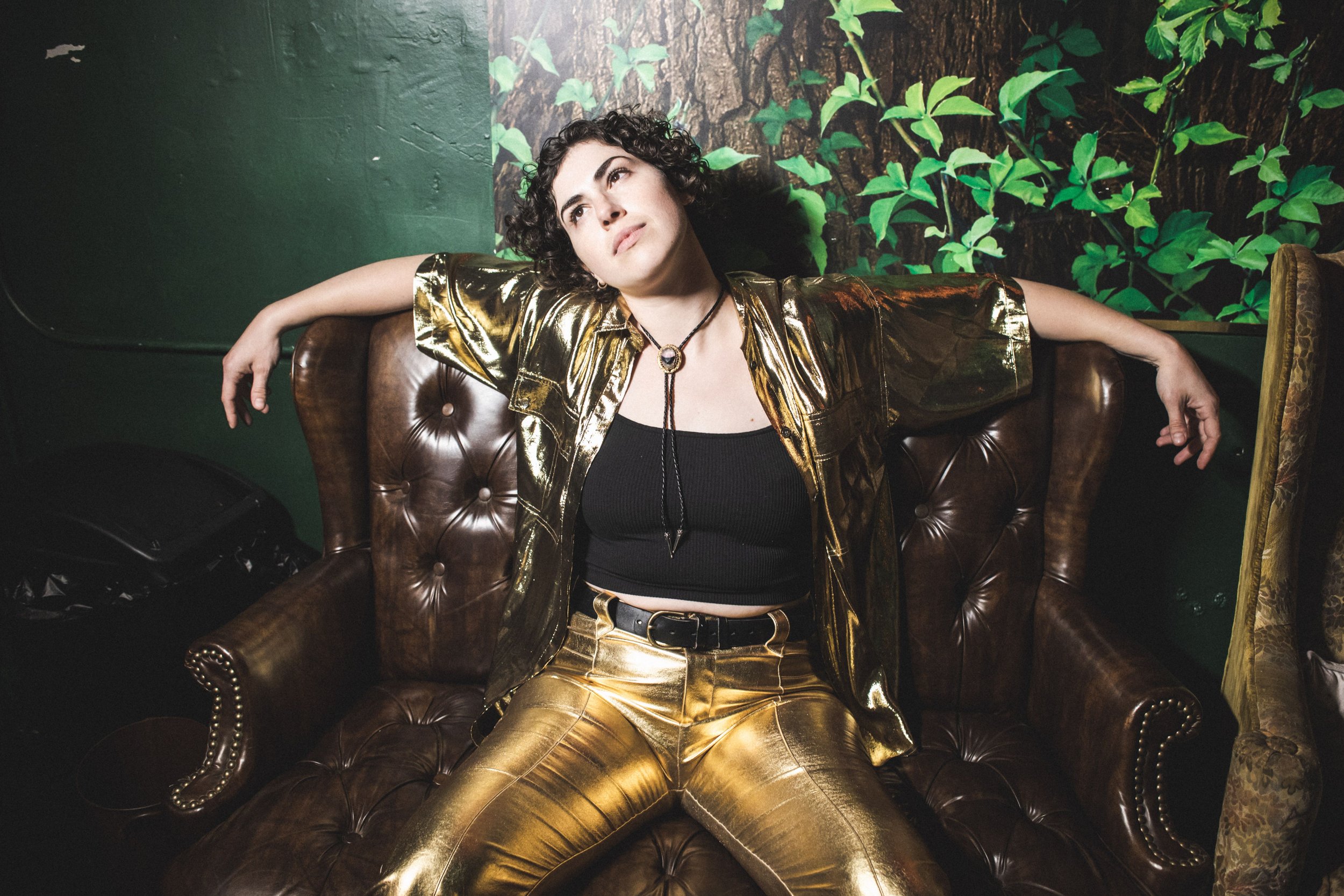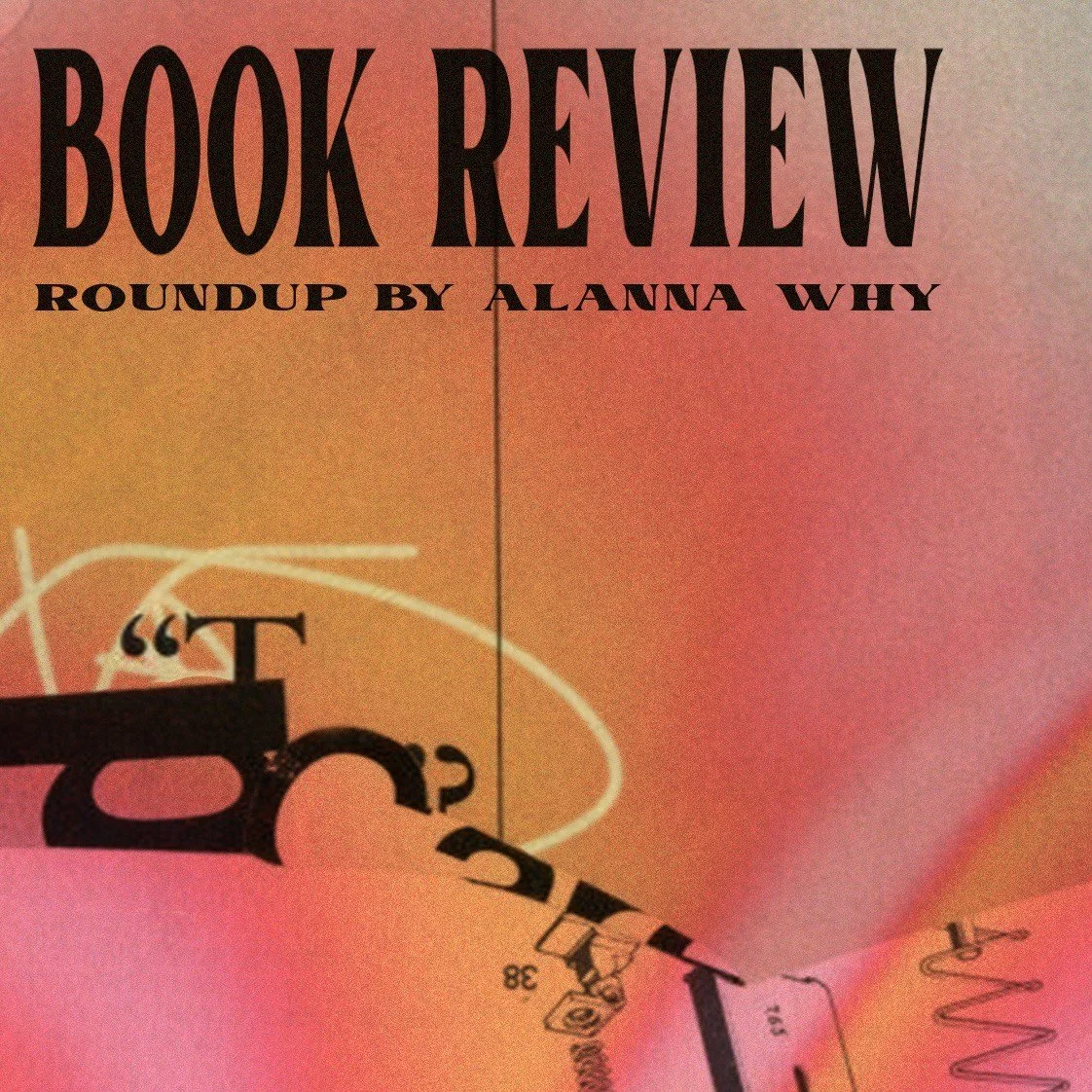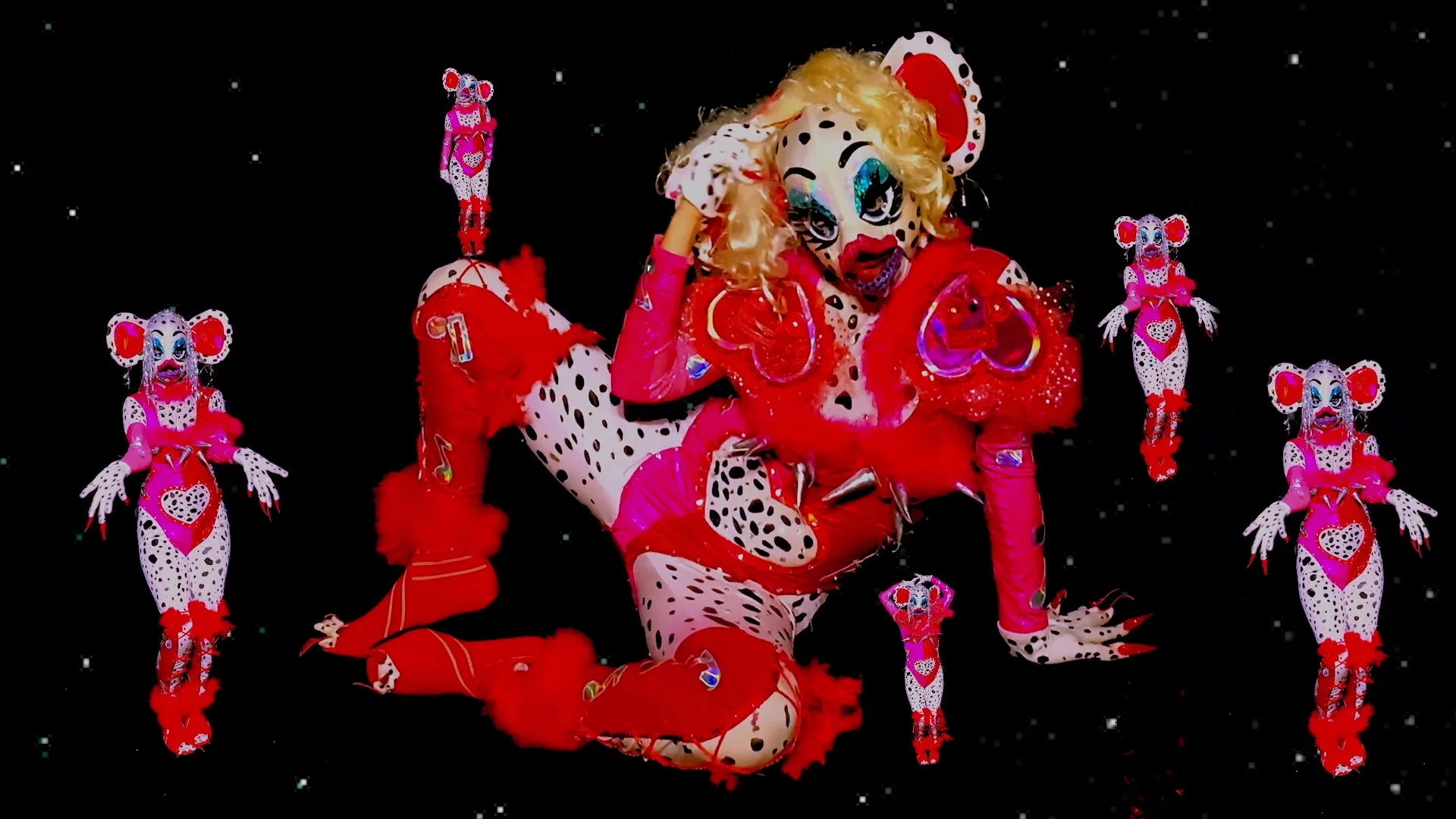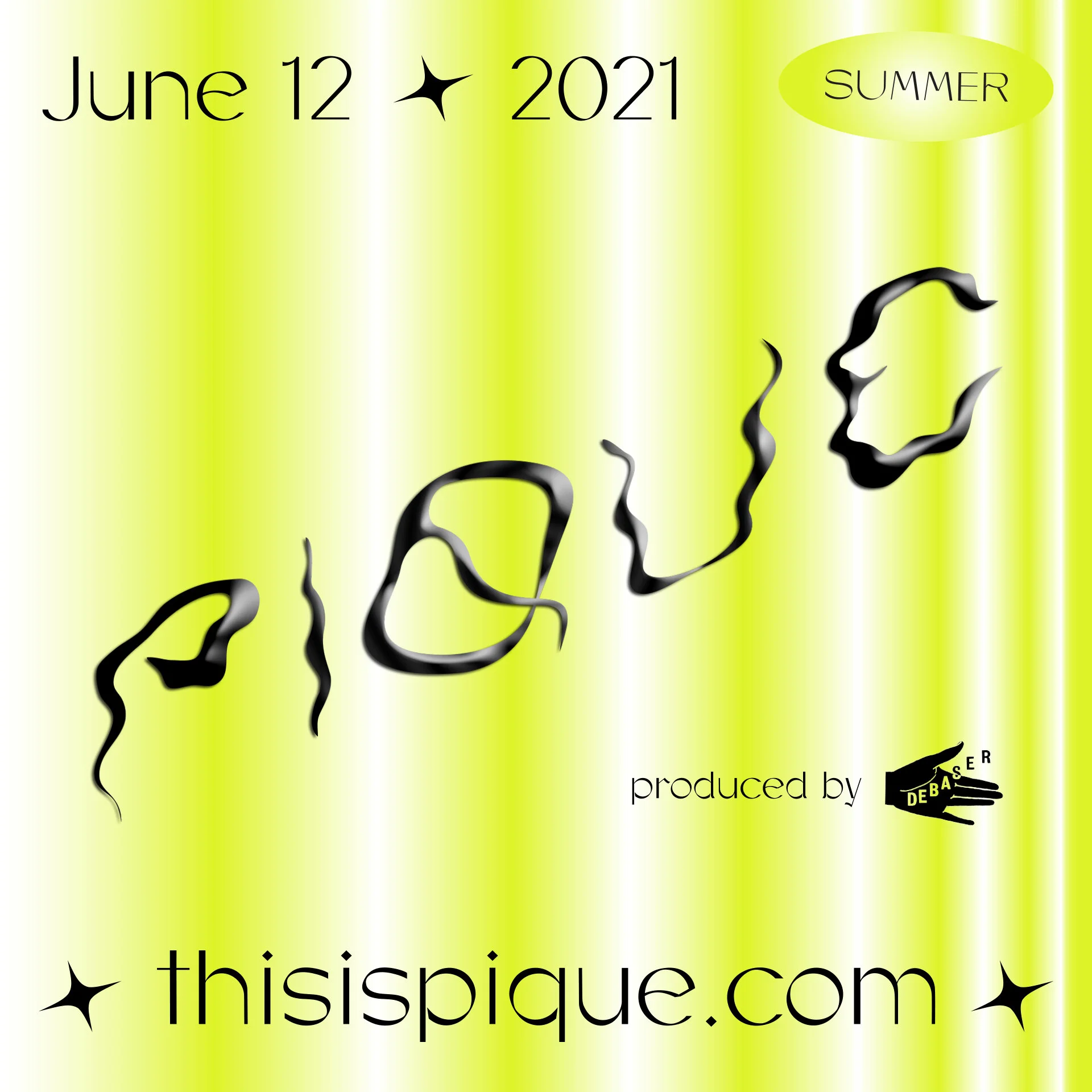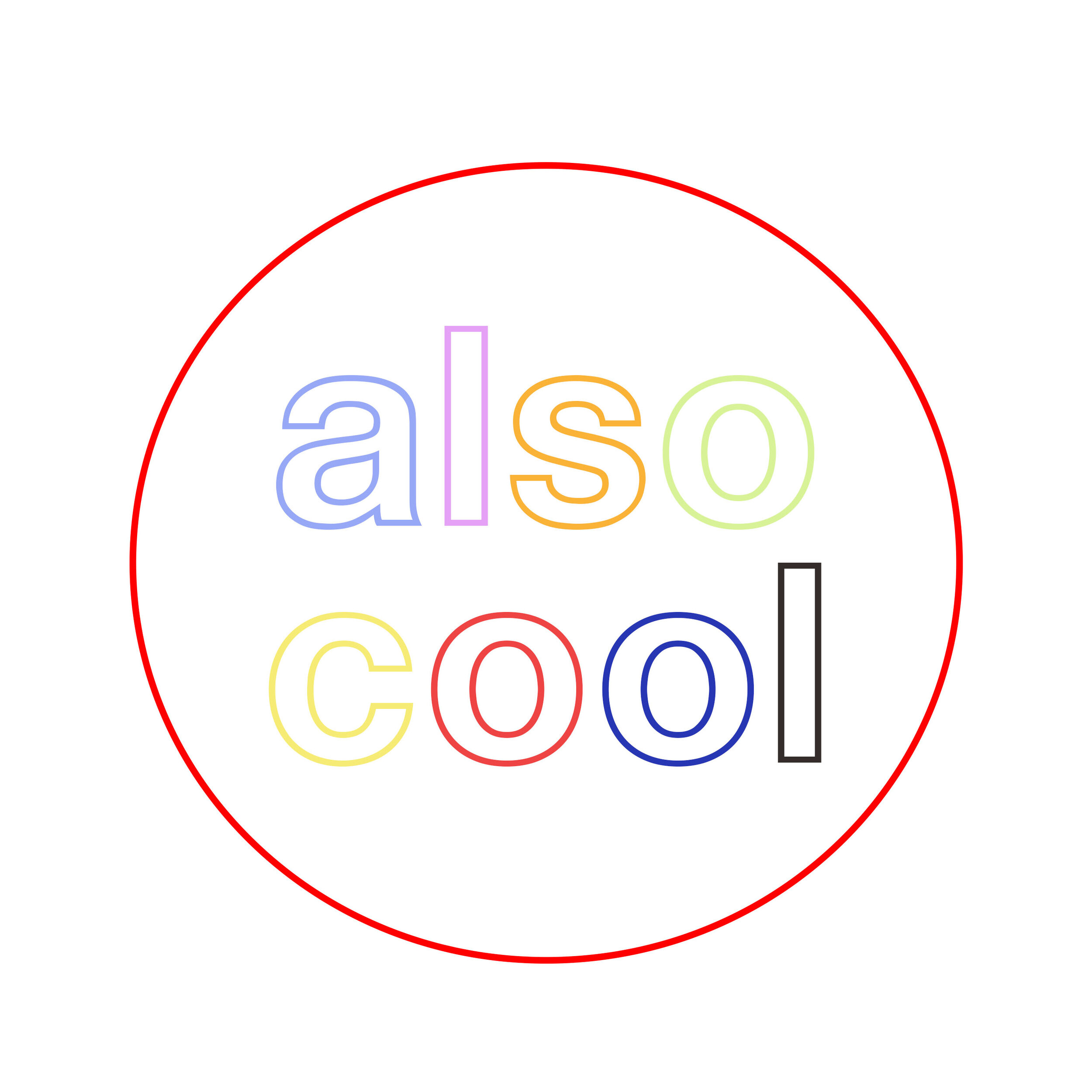For Pleasure: An Essay
Illustration by Malaika Astorga
« Pâtes ou poulet? »
« Pâtes, s'il vous plaît. »
The stewardess rapidly picked a combination of little containers and handed over the grey tray. While I waited for the moment when I could take off my mask, I analyzed the food and its disposable packagings: pasta in the aluminum cuboid, a transparent plastic pot with indistinguishable veggies, plastic cutlery, tiny paper packs of salt and pepper, plastically -contained vinegar, a chewy piece of bread, a butter stick, hand wipes, napkins, cookies. I opened the pasta container to find overcooked red sauce. There is something about the aesthetics of airplane food that makes it more believable that we're travelling amongst clouds at hundreds of kilometres per hour.
I was feeling heavy. I had just finished the book O Peso do Pássaro Morto by Aline Bei. The romance asks the question, "How much loss fits in a woman's life?" Chapter by chapter, new layers of pain were revealed for the character. Each chapter recounts a year of life, of abuse, of an obligation of performance, of loneliness. It was the mix of the plane's constant buzz and my rage against how women are expected to endure struggles that made me look at the butter stick and desire its melting decadence to moisten the stale pasta. When this thought first crossed my mind, I smiled. What if my partner sees that? Health, other than the events of disease, is a performance. Sitting in the middle chair of the corridor line, I imagine my neighbours watching me dissolve the cholesterol stick into my meal.
Tired of other people's expectations of her, Cléo from Agnes Varda's Cléo de 5 a 7 takes control of her own narrative, proclaiming: "Damn Tuesday! I'll do as I like." She dresses in a stupid winter hat and goes for a summer walk. Bei's protagonist never told off the legislators who postulated how she should live her life. She embodied silence, and silently she died, choked on her own puke.
Thinking of both women, I decided I'd prefer wearing more stupid winter hats.
I first took one-quarter of the mini butter stick. The saltiness and fat of the butter smoothened the texture of the tomato sauce. I checked my surroundings and melted the rest of the butter into my aluminum container. By the end of the meal, I was overcome by the adrenaline of rebelling against public eating norms. I was victorious over shame. I giggled to myself. It was probably confirmation bias, but instantaneously my face felt greasier. There was a silly intensity of joy. A joy that is based on not giving in to the Panopticon. I proposed to myself an experiment. I wanted to try the opposite of Bei's character. I decided to go on a one-month journey searching for the answer to “How much pleasure fits in a woman's life?”
We arrived from the airport, dropped my luggage off at my house, did groceries, and started cooking vegan burgers. My partner's roommates arrived all together. One of them had said they would welcome us with cake and beer. Instead, they came in time for my partner to cook them dinner. I listened to their discussion of domestic issues in French. I questioned if I was already failing in the search for pleasure. Exhausted from the jet lag, we went to bed. Before the light was turned off, I looked at my partner and said I wouldn't go on the canoeing trip with his friends anymore. He opened his eyes wide and asked why.
I had explained the idea of a hedonistic month earlier when the airplane landed. So I replied, “I don't think I will have fun.”
In the dim room, I contained my smile. For once, I didn't re-explain that my French is not agile enough to participate in conversations, and his friends—although bilingual Montrealers—weren't quite welcoming to anglophones. Anglophone… as if Portuguese wasn't my first language, as if English always came to me smoothly. For all I didn't say, I allowed the smile to cover my face in its grease.
My partner was clearly disappointed with me for backing off less than a week before the trip. I hardly ever cancel plans with anyone. I felt guilty, but then he asked if this pleasure thing was serious. Yes, it is! I felt empowered by my research. I was ready to focus on making my own plans.
I imagine some activities as reserved for my elderly self. Having chickens, trail running, naked live modelling. In search of stuffing my life with as much pleasure as possible, I took inspiration from the bucket list I have prepared for when I'm very wrinkled. A big part of the list involved me being fitter, wiser or the owner of a backward, but being bare is ageless. I proceeded to make the arrangements for naked live modelling. I messaged a friend of a friend who organized the event. I rehearsed poses and balancing. I wanted the pleasure of feeling that the body is no other than a still-life composition.
On a Wednesday, looking at the evening lights of Place des Arts, I felt like Dorothée. In Varda's movie, Cléo asks if Dorothée didn't feel too exposed when live modelling. Dorothée replied: “Nonsense! My body makes me happy, not proud. They're looking at more than just me. A shape, an idea. It's as if I wasn't there."
Standing. Sitting. Laying. My body received attention but without being a target. For once, it was only marked by its stillness.
I maximized pleasure whenever possible while maintaining my functional adult duties. I said more NOs in that week-and-a-half than I had done in the past couple of months. I was overjoyed by committing to finishing my poetry manuscript. And when I wasn't writing, I spent time with my beloved community. I was unaware at the time, but I practiced part of Epicurus’ ethics: the priority of friendships. I searched for ataraxia, the lack of suffering and the feeling of calm and enjoyment. I asked myself constantly: “Will this bring me joy?”
I only saw my partner twice or thrice in the first two weeks, and he wasn't ever quite spiritually present. Once I stopped going to his friends' events just because I wanted to see him, we hardly ever saw each other. And he had always been too busy to spend time with my friends.
After a weekend with friends, foraging mushrooms, dancing and meeting new people, I missed him. On Monday morning, I proposed dinner at 7:30 PM at my place. He agreed, until at 4 PM when he texted me: "Actually, I think I am gonna go climb. But see you around 9."
I read the message, defeated. There was the same amount of disconnection with him as all the connection I felt with my friends. Earlier on that day, in therapy, I asked: “How do I know when it is a hard phase, and when it is over?” It had never quite been an easy relationship, but the struggles had solidified in the past two months. Instead of replying, my therapist exchanged questions. "Did you find the answer?" I am always afraid that I know too well what my therapist wants to say when she doesn't reply directly.
Still holding my phone after reading the text, I started crying on the sofa. My roommate came to check what was happening. “It needs to be over today,” I told her, and she knew exactly what I was referring to.
I cleaned the tears from my face. “I'm tired of being sad about this. I'm gonna go on a run.” Angry, I left the apartment. I mentally screamed at myself that I had let this go on for too long, that I had tried, but that love doesn't work by itself.
It was a ridiculous idea to run while my breathing system was busy with hiccups. I sat down. Angry. Crying. No endorphins were created.
I should be focusing on my pleasure, goddamn it!
He arrived at my place at 8:40 PM. I was slightly high from a friend's joint. He asked about my weekend, and I described the events, clearly overwhelmed by joy.
"How about me? Where am I in your amazing life?"
“Yeah, you are never really around in these moments.” The words left my mouth easily. The anxiety that this topic had always brought me was brushed away by the weed.
"What should we do about it?"
I knew he expected me to ask him to be there. But I felt so neglected asking, it would be naïve to ask for presence. I was tired, and my head was clear. “I think we should break up.”
He stopped for a couple of seconds, realizing I was serious. In the next hour, I calmly explained my reasons: I didn't want to feel like I was the only one trying, I felt invisible, like his desires were always bigger than mine. I wanted someone that wanted to be in my life. Actively.
He said he loved me. He said it made sense. He said he felt like shit while climbing. He said it was true that he took me for granted. He approached me for a hug.
In my head, I narrated the event: This is our last hug. Now, we'll never have sex, we'll never wake up together, and we'll never be partners again. The hug ended.
"So, how do we fix this?"
I started falling behind on pleasure. Academically, I felt drowned. After spending September doing the bare minimum and spending most of my time finishing the manuscript, I was burned out. Months before, I had decided to engage in the Honours program. I had enrolled in classes that I would have never taken if I had seriously considered the enjoyment factor. I thought of it as a pain necessary for the pleasure of a future self.
Every week I was assigned to read English texts from the Renaissance and the 18th century. I had always avoided European period literature courses because their title describes all the readings well: stories of white men for white men. That is required if you want to be "honoured." Complaining about the required courses was a useless complaint summarized by a good friend: "Well, Laura, it was you who decided to do gringo studies. Hold the bomb."
Trying, or in a Brazilian Portuguese direct translation: "holding the bomb," felt contrary to my pleasure search. I found myself incapable of prioritizing my own present pleasure. The difficulty wasn't gendered. Joy was withheld by my distaste for what I had decided to take in university and the complexities of trying to discover how to make love work. I tried choosing pleasure, failed, and found myself miserable by not guaranteeing a minimal level of hedonism.
My pleasure notes became a food diary. While I felt emotionally exhausted, I indulged in every possibility of savouring delight. Natural wine, double chocolate ice cream, Brazilian coffee. On September 30th, I wrote: A night of decadence with new friends. Asking for a shameless amount of dessert to take home. The capability to not worry about how my request is perceived by others.
Good meals create space for other pleasures. It was the first time my partner and I explored social occasions that were new for both of us simultaneously. Until then, "new" was always one-sided. COVID couples and their assigned bubbles! In our new friendship with C., we found mid-ways. She was French; knowledgeable about wine like him, full of emotions and with a musical taste like mine.
We took the bus back home, giggling at the lovely night. Holding my container with five huge slices of vegan tiramisu, I discovered a new capability of our relationship: to build together in the world.
The next day, my partner and I shared the experience of a horrible hangover.
"We shouldn't have drank five bottles of wine."
He had forgotten the existence of the last bottle, a type of sweet apple wine.
I went home. Sick, I realized that the pleasure experiment was supposed to end on that day. I felt defeated. The pleasure was unattainable amidst the anxiety I felt for half of the experiment. I refused the conclusion that my complete pleasure was short-lived, a two-week enjoyment followed by the struggle with reality for the rest of the month. I extended the experiment for a month.
At this point, I pressured myself into finding ways to feel pleasure. My university time was filled with imposter syndrome and anxiety, and to balance, I would go hard on the weekends. A party wasn't a party anymore. It was a way not to fail at pleasure.
My search started as a refusal to believe that there is always more space for pain in a woman's life. I wanted to explore how women tend to compromise more than men. And in part, the instinct of thinking about the lack of pleasure as gendered was fruitful. By refusing to push aside my priorities, my relationship improved and found new ways of being. Yet, as for the rest of my life, the difficulties were based on what I projected as expected of me and the things my self-critic identified as failures.
For the second month, I needed to do better, and YouTube had lots of theories on how to achieve "better." I didn't fall into a pyramid scheme by trendy coaches. Instead, I went on a rabbit hole of Epicurean hedonism. Focus on friends, no romantic relationships, no decadent eating, and no big ambitions. Clearly, I had been doing it all wrong. For the philosopher that inspired the first hippie communes, less is more; just go live in the mountains with some friends, reading the most and working as little as possible. Entirely unfeasible, in my opinion. If I had followed Epicurus, I would have dropped out, broken up and not eaten five slices of vegan tiramisu.
I wasn't searching for symmetry, but I found the closure of the experiment in a book.
There are a dozen and a half marks in my copy of Made-Up by Daphné B. Most of them highlight exciting ways of thinking about make-up and capitalism. Close to the end, B. remembers Anne Carson's vision of desire: the movement to pick the fruit on the highest branch of a tree. The book then proposes a new question: "Why not write biographies from the point of view of what a person desired, rather than what they achieved?" I marked on the page a huge arrow and wrote: "EXERCISE IT!!!"
Epicurus was wrong. A big part of pleasure is ambition. And it is not about the lack of pain, it is the will to search for joy even when a person is exhausted and defeated. Through the mix of Carson and B.'s thoughts, the answer to “How much pleasure fits in a woman's life?” is always as many times as I go up the ladder to reach for the furthest fruit.
My “stupid winter hat” is a run while I am sobbing, and hangovers of wonderful nights. Pleasure is searching.
Laura Mota is a Brazilian writer, portrait photographer, and shameless experimentalist in other mediums based in Tiohtiá:ke/Montreal. Her poetry has been published by PRISM International, carte blanche, High Shelf, and elsewhere. Laura's creative nonfiction was included in the issue "Generations" of Held Magazine.

